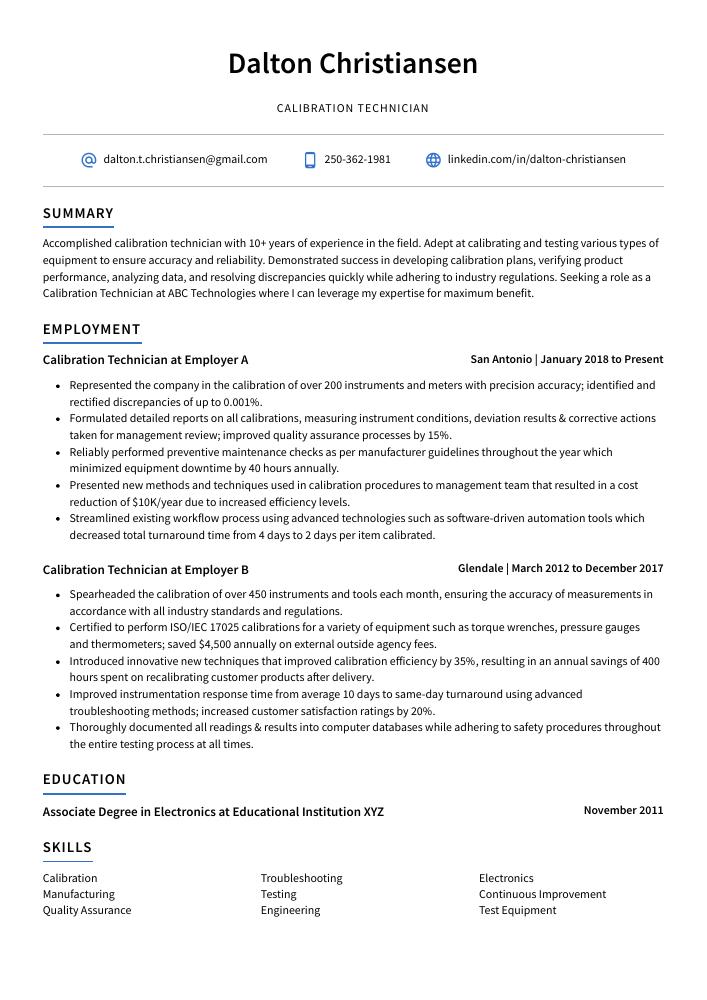Calibration Technician Resume Guide
Calibration Technicians are responsible for ensuring that measuring devices and instruments remain accurate. They test, adjust, calibrate and repair a variety of equipment such as scales, balances, thermometers and pressure gauges to ensure accuracy in readings. They also document all calibration activities according to industry standards.
You have a keen eye for detail and an impressive knowledge of calibration techniques. But employers in the industry are unaware of what you can bring to their team. To make them take notice, you must write a resume that stands out from the crowd.
This guide will walk you through the entire process of creating a top-notch resume. We first show you a complete example and then break down what each resume section should look like.
Table of Contents
The guide is divided into sections for your convenience. You can read it from beginning to end or use the table of contents below to jump to a specific part.
Calibration Technician Resume Sample
Dalton Christiansen
Calibration Technician
[email protected]
250-362-1981
linkedin.com/in/dalton-christiansen
Summary
Accomplished calibration technician with 10+ years of experience in the field. Adept at calibrating and testing various types of equipment to ensure accuracy and reliability. Demonstrated success in developing calibration plans, verifying product performance, analyzing data, and resolving discrepancies quickly while adhering to industry regulations. Seeking a role as a Calibration Technician at ABC Technologies where I can leverage my expertise for maximum benefit.
Experience
Calibration Technician, Employer A
San Antonio, Jan 2018 – Present
- Represented the company in the calibration of over 200 instruments and meters with precision accuracy; identified and rectified discrepancies of up to 0.001%.
- Formulated detailed reports on all calibrations, measuring instrument conditions, deviation results & corrective actions taken for management review; improved quality assurance processes by 15%.
- Reliably performed preventive maintenance checks as per manufacturer guidelines throughout the year which minimized equipment downtime by 40 hours annually.
- Presented new methods and techniques used in calibration procedures to management team that resulted in a cost reduction of $10K/year due to increased efficiency levels.
- Streamlined existing workflow process using advanced technologies such as software-driven automation tools which decreased total turnaround time from 4 days to 2 days per item calibrated.
Calibration Technician, Employer B
Glendale, Mar 2012 – Dec 2017
- Spearheaded the calibration of over 450 instruments and tools each month, ensuring the accuracy of measurements in accordance with all industry standards and regulations.
- Certified to perform ISO/IEC 17025 calibrations for a variety of equipment such as torque wrenches, pressure gauges and thermometers; saved $4,500 annually on external outside agency fees.
- Introduced innovative new techniques that improved calibration efficiency by 35%, resulting in an annual savings of 400 hours spent on recalibrating customer products after delivery.
- Improved instrumentation response time from average 10 days to same-day turnaround using advanced troubleshooting methods; increased customer satisfaction ratings by 20%.
- Thoroughly documented all readings & results into computer databases while adhering to safety procedures throughout the entire testing process at all times.
Skills
- Calibration
- Troubleshooting
- Electronics
- Manufacturing
- Testing
- Continuous Improvement
- Quality Assurance
- Engineering
- Test Equipment
Education
Associate Degree in Electronics
Educational Institution XYZ
Nov 2011
Certifications
Certified Calibration Technician (CCT)
International Society of
May 2017
1. Summary / Objective
Your resume summary should provide the employer with a snapshot of your skills and experience as a calibration technician. For example, you can mention the various types of equipment you have calibrated in the past, any certifications or qualifications that make you stand out from other applicants, and how many successful calibrations you completed during your current role.
Below are some resume summary examples:
Reliable calibration technician with 5+ years of experience in the medical device industry. At XYZ, performed calibrations on a wide variety of instruments and equipment used for patient care, including blood pressure monitors and ventilators. Developed an efficient calibration system that reduced turnaround times by up to 20%. Proven track record of ensuring accuracy and reliability through precise measurements according to strict government regulations.
Talented calibration technician with 5+ years of experience in the calibration and repair of laboratory equipment. At XYZ, handled all aspects of instrumentation troubleshooting and resolution for over 100 pieces of lab equipment. As a member of the QA team, developed new procedures to improve accuracy while decreasing turnaround time by 10%. Frequently recognized as an efficient problem solver who can be counted on to complete projects quickly.
Passionate Calibration Technician with 8+ years of experience calibrating and repairing complex instruments in the field. At XYZ, I was responsible for calibration of over 50 different types of equipment to ensure accuracy and precision. Received multiple awards from supervisors for my ability to troubleshoot difficult problems quickly and effectively while meeting deadlines on time or ahead of schedule.
Amicable and detail-oriented calibration technician with 7+ years of experience in the engineering field. Adept at quickly identifying and resolving issues related to accuracy and precision for a wide range of equipment, from thermometers to gas chromatographs. Looking to bring my expertise as well as effective communication skills to ABC Lab in order to ensure quality assurance processes are maintained.
Proficient calibration technician with 5+ years of experience in servicing, troubleshooting and repairing a variety of high-precision instruments. Accomplished at calibrating instruments to the highest accuracy standards while ensuring compliance with industry regulations. Seeking to join ABC Tech as their next calibration technician where I can use my expertise for the benefit of their clients.
Detail-oriented calibration technician with 5+ years of experience in performing calibration services for a variety of electronic and mechanical devices. Skilled in troubleshooting, calibrating, and repairing equipment to specifications. Developed automated testing protocols that improved accuracy by 30%. Received numerous commendations from clients for excellent customer service skills.
Determined and organized Calibration Technician with 3+ years of experience managing and overseeing precision measuring instruments. Demonstrated ability to accurately assess instrument accuracy, calibrate complex machinery, analyze data and generate detailed reports. Seeking a position at ABC Company to utilize my skills in troubleshooting mechanical systems for optimal performance.
Professional calibration technician with 8+ years of experience in the field. Skilled at working autonomously and as part of a team to calibrate, service, maintain, and repair precision instruments and systems. Seeking an opportunity to join ABC Tech where I can utilize my technical skillset to help ensure accurate performance for their customers.
2. Experience / Employment
In the experience section, you should list your employment history in reverse chronological order. This means that the most recent job is listed first.
When writing about what you did at each job, use bullet points to make it easier for the reader to digest and understand what you are saying. You want to provide detail here so that they can get a good understanding of your experience level and accomplishments. For example, instead of just saying “Calibrated instruments,” try something like this: “Successfully calibrated over 500 pieces of equipment within tight deadlines using advanced calibration software.”
To write effective bullet points, begin with a strong verb or adverb. Industry specific verbs to use are:
- Calibrated
- Adjusted
- Inspected
- Tested
- Troubleshot
- Repaired
- Monitored
- Analyzed
- Documented
- Programmed
- Configured
- Operated
- Aligned
- Certified
Other general verbs you can use are:
- Achieved
- Advised
- Assessed
- Compiled
- Coordinated
- Demonstrated
- Developed
- Expedited
- Facilitated
- Formulated
- Improved
- Introduced
- Mentored
- Optimized
- Participated
- Prepared
- Presented
- Reduced
- Reorganized
- Represented
- Revised
- Spearheaded
- Streamlined
- Structured
- Utilized
Below are some example bullet points:
- Tested and calibrated a range of mechanical, electrical and electronic instruments to ensure accuracy, reducing calibration errors by 25%.
- Troubleshot complex technical issues in laboratory equipment and rectified problems within 24 hours; reduced maintenance costs by $2,000 over the last year.
- Aligned components such as sensors, gauges & transducers according to precise specifications for optimal performance; improved overall system reliability by 40%.
- Accurately documented test results on all calibrations performed with clear notation of reference standards used; decreased time taken for traceability review checkups by 15 minutes per instrument.
- Inspected data logging devices regularly to identify any discrepancies or faults prior to customer acceptance tests; prevented potential product recalls which saved an estimated $4,500 in losses over six months period.
- Developed calibration strategies for over 50 instruments, resulting in a 4% improvement in accuracy and efficiency.
- Adjusted and repaired machinery to meet factory safety standards; reduced downtime by 20%.
- Utilized precision measuring techniques when calibrating electrical, mechanical & dimensional equipment with 100% accuracy rate per quarter.
- Participated actively in brainstorming sessions to identify problems that could arise during calibration processes; developed preventive measures which decreased occurrence of errors by 30%.
- Resourcefully repurposed parts from other machines to create cost-effective solutions while maintaining superior product quality standards; saved the company $10K annually on repair costs alone.
- Repaired and calibrated over 75 electrical and electro-mechanical instruments per month, reducing instrument down time by 40%.
- Actively tracked calibration records of all laboratory equipment to ensure accuracy; identified discrepancies and improved data management efficiencies by 31%.
- Expedited production operations through the timely maintenance of measuring devices, resulting in a 15% increase in throughput within a six-month period.
- Achieved an average precision level of +/- 0.005 mm for temperature sensors after successfully completing up to 200 calibrations daily with minimal supervision from senior technicians.
- Configured new measurement systems according to customer specifications while ensuring strict adherence to safety protocols; reduced setup times by 25%.
- Independently calibrated over 100 instruments and equipment, ensuring precise readings in accordance with industry standards.
- Documented calibration results and performed necessary corrective actions to ensure accuracy of the measurements; reduced instrument variance by 3%.
- Revised existing maintenance procedures for all new calibrated devices based on current regulations and best practices; improved system reliability by 12%.
- Structured detailed reports outlining findings from instrument calibrations which were submitted to Quality Assurance personnel for review purposes.
- Assessed gauges used in production processes against established quality control guidelines, improving product consistency by 5% compared to previous year’s performance metrics.
- Prepared calibration and maintenance plans for over 50 pieces of equipment, ensuring that all instruments were within specified tolerances; decreased calibration time by 20%.
- Advised technicians on best practices to follow during the calibration process and trained new employees in proper use of test equipment.
- Confidently identified issues with high-precision measuring systems using manual testing methods, leading to successful resolution of problems before they affected production quality or safety standards.
- Facilitated regular equipment audits and re-calibrations for clients throughout the region, resulting in improved customer satisfaction ratings by 30%.
- Reorganized inventory tracking system used for spare parts management, decreasing lead times from 3 days to 1 day per order fulfillment request.
- Analyzed and evaluated the performance of over 50 calibration instruments, ensuring that all measurements met industry standards; lowered measurement errors by 12%.
- Monitored and tracked equipment conditions to identify potential issues and recommend preventative maintenance, resolving 35+ instrument malfunctions in the last 6 months.
- Coordinated with production teams on a daily basis to confirm calibrations were conducted according to specifications and schedule requirements; reduced downtime incidents by 30% within 3 months.
- Consistently maintained accurate records for all calibrations performed, including detailed logs for each machine’s status/condition as well as repair history; improved data accuracy rate from 80% to 96% in 1 year.
- Compiled comprehensive statistical reports documenting the safety & accuracy of various machines used in production processes at monthly intervals; saved up $10K annually through better process optimization strategies implemented based on data analysis findings.
- Demonstrated expertise calibrating, testing and configuring instruments to ensure accuracy in readings with a 0.02% margin of error; reduced calibration time by 45 minutes per device on average.
- Operated precision measuring equipment such as multimeters, oscilloscopes and power meters to measure electrical characteristics like voltage, current or resistance; completed over 100 calibrations each week.
- Optimized performance and functionality of various devices using advanced software tools like LabView and Matlab; identified bugs & errors within the system that caused inaccurate results for 17 machines in total during Q4 of 2020 alone.
- Effectively documented all activities related to instrumentation maintenance including adjustments made, settings changed etc.; updated company database regularly with accurate records which enabled fast retrieval when needed later on down the line.
- Mentored 5 new technicians who joined the team during their onboarding period – provided guidance regarding workflows & processes while teaching them how best to utilize measurement tools available at hand safely & effectively.
- Competently programmed and calibrated over 500 laboratory instrumentation systems per month, improving accuracy levels by 10%.
- Reduced downtime for calibrations of high-end equipment by 8 hours on average every week, resulting in a $5,000 savings for the company.
- Ensured that all calibration activities were compliant with industry standards such as ISO 9001/ISO 17025; created detailed reports to document any deviations found during tests or inspections.
- Carried out routine maintenance checks and repairs to ensure proper functioning of precision measurement tools; proactively identified problems before they caused malfunctions or disruption of service delivery.
3. Skills
Skill requirements will differ from employer to employer – this can easily be determined via the job advert. Organization ABC may require a calibration technician to be proficient in using certain types of equipment, while organization XYZ may need someone who is an expert at troubleshooting.
Therefore, you want to tailor the skills section of your resume to each job that you are applying for. This is important because many employers use applicant tracking systems these days which scan resumes for specific keywords before passing them on to a human.
In addition, it’s also beneficial if you can elaborate on some of the most relevant skills in other sections such as experience or summary – this will give recruiters more insight into how well-suited you are for their role and what kind of value you could bring should they hire you.
Below is a list of common skills & terms:
- 5S
- Aerospace
- Automation
- Calibration
- Continuous Improvement
- DoD
- Electrical Troubleshooting
- Electricians
- Electronics
- Electronics Repair
- Engineering
- FDA
- GMP
- ISO
- Inspection
- Instrumentation
- Lean Manufacturing
- Maintenance and Repair
- Manufacturing
- Medical Devices
- Metrology
- Military Experience
- Multimeter
- Preventive Maintenance
- Process Improvement
- Quality Assurance
- Quality Control
- Quality System
- Root Cause Analysis
- SPC
- Security Clearance
- Six Sigma
- Software Documentation
- Soldering
- Team Leadership
- Teamwork
- Test Equipment
- Testing
- Time Management
- Troubleshooting
- Validation
4. Education
Adding an education section to your resume will depend on how far along you are in your career. If you just graduated and have no experience, mention your education below the resume objective. However, if you have been working as a calibration technician for years with plenty of experience to showcase, omitting the education section is perfectly acceptable.
If an education section is included, try to list courses or subjects related to calibration that may be relevant to the job you are applying for.
Associate Degree in Electronics
Educational Institution XYZ
Nov 2011
5. Certifications
Certifications are a great way to demonstrate your knowledge and proficiency in a certain field. Employers will be interested in seeing what certifications you have obtained, as it shows that you are committed to staying up-to-date with the latest industry trends.
Including any relevant certifications on your resume can help give employers an idea of how qualified you are for the position they’re looking to fill. It also demonstrates that you take initiative when it comes to professional development and staying current with industry standards.
Certified Calibration Technician (CCT)
International Society of
May 2017
6. Contact Info
Your name should be the first thing a reader sees when viewing your resume, so ensure its positioning is prominent. Your phone number should be written in the most commonly used format in your country/city/state, and your email address should be professional.
You can also choose to include a link to your LinkedIn profile, personal website, or other online platforms relevant to your industry.
Finally, name your resume file appropriately to help hiring managers; for Dalton Christiansen, this would be Dalton-Christiansen-resume.pdf or Dalton-Christiansen-resume.docx.
7. Cover Letter
Writing a cover letter is a great way to make your job application stand out from the crowd. It’s made up of 2-4 brief paragraphs and provides an opportunity for you to explain why you are the best fit for the role.
Cover letters allow recruiters to get an understanding of who you really are, beyond what is written on your resume. They also provide insight into how well you communicate, as most employers will be looking for someone with strong writing skills too. Even if it isn’t required in the job description, having one ready can help maximize your chances of being hired!
Below is an example cover letter:
Dear Aidan,
I am writing to apply for the position of Calibration Technician at ABC Corporation. I am a highly skilled and experienced calibration technician with over 10 years of experience working in this field. In my current role, I am responsible for calibrating a wide range of equipment including:.
-pressure gauges
-thermometers
-flow meters
-level indicators
-weight scales
My experience has taught me how to properly use all the necessary tools and software programs related to calibration, as well as how to troubleshoot any issues that may arise. I have an excellent eye for detail, which allows me to spot even the smallest errors or discrepancies. Additionally, I have superb customer service skills and always work closely with clients or customers to ensure they are satisfied with the end result.
I believe that my skills and qualifications make me the perfect candidate for this position, and I would be a valuable asset to your team. I look forward to speaking with you soon about this opportunity. Thank you for your time and consideration.
Sincerely,
Dalton
Calibration Technician Resume Templates
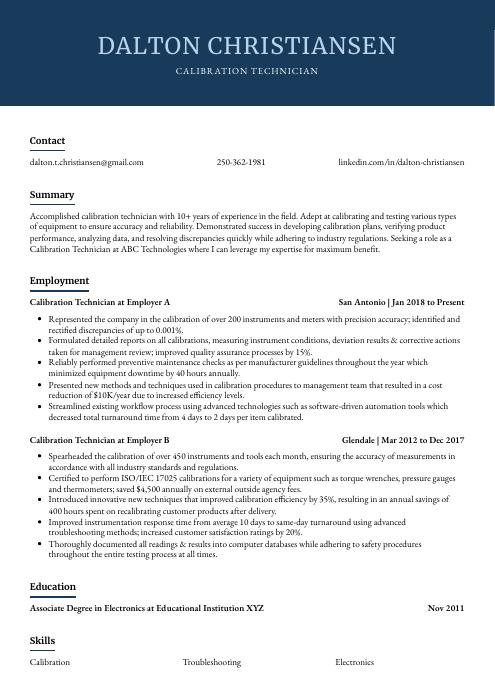 Bonobo
Bonobo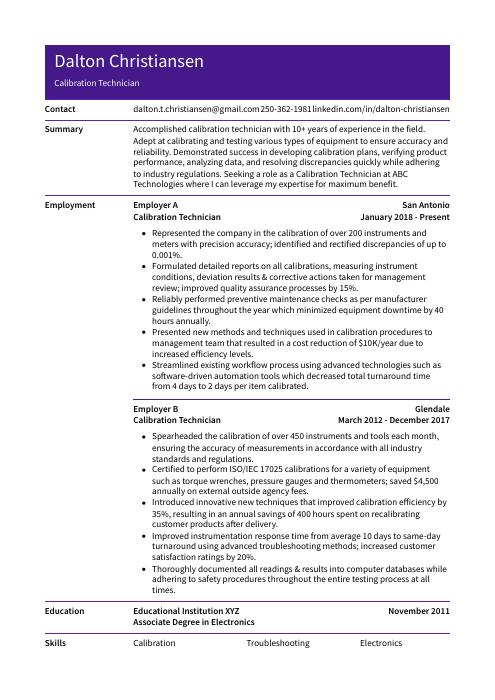 Pika
Pika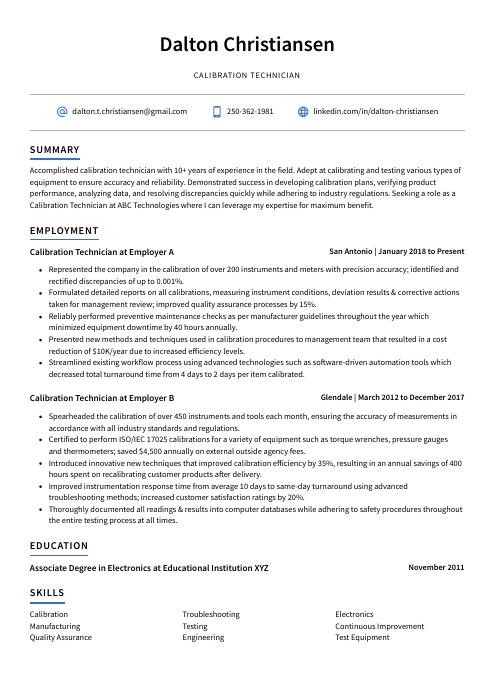 Axolotl
Axolotl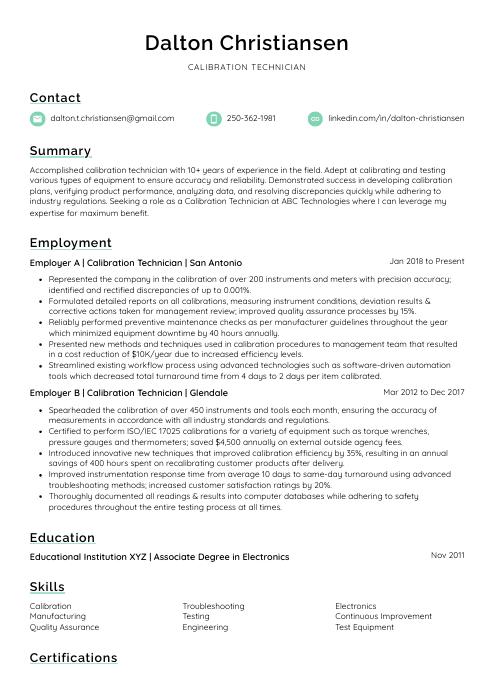 Lorikeet
Lorikeet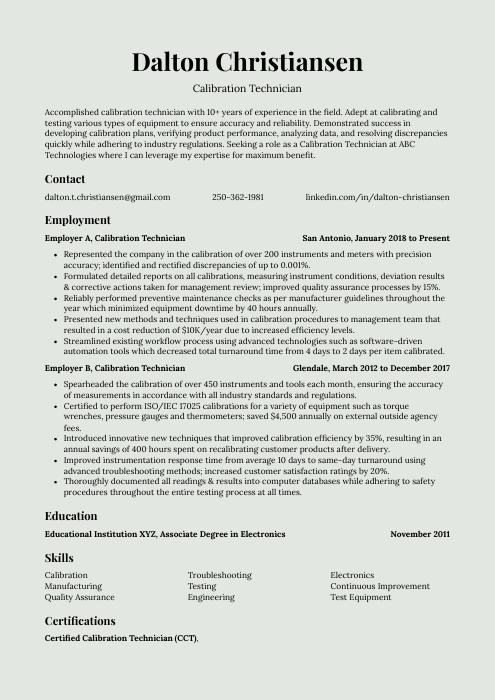 Saola
Saola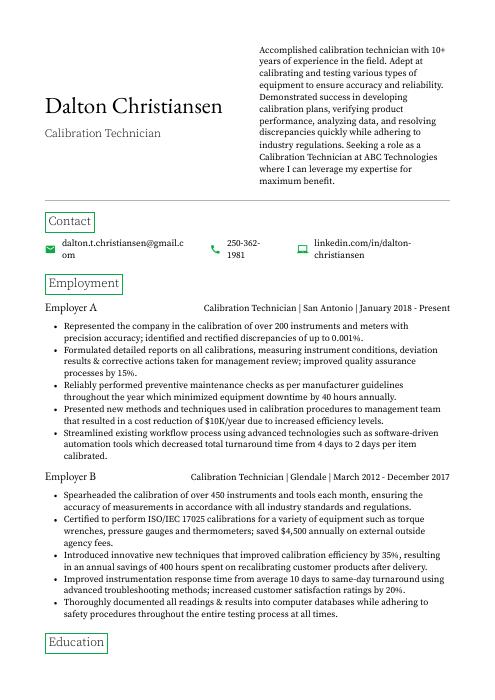 Quokka
Quokka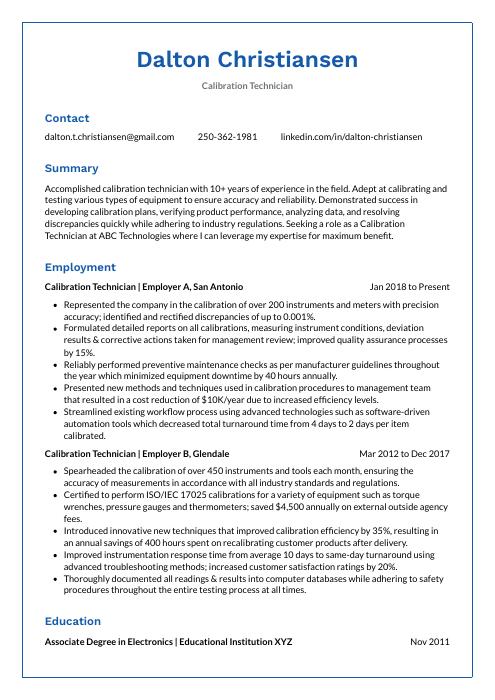 Markhor
Markhor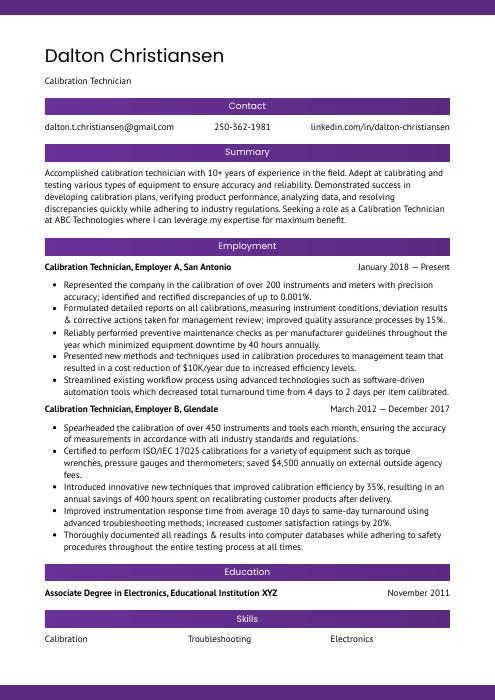 Jerboa
Jerboa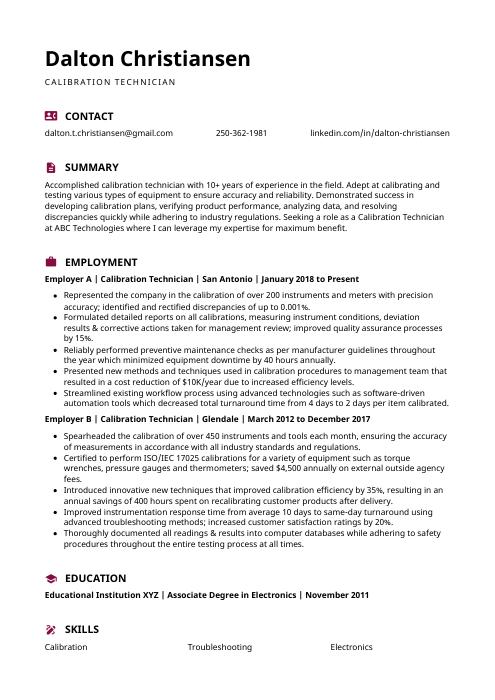 Hoopoe
Hoopoe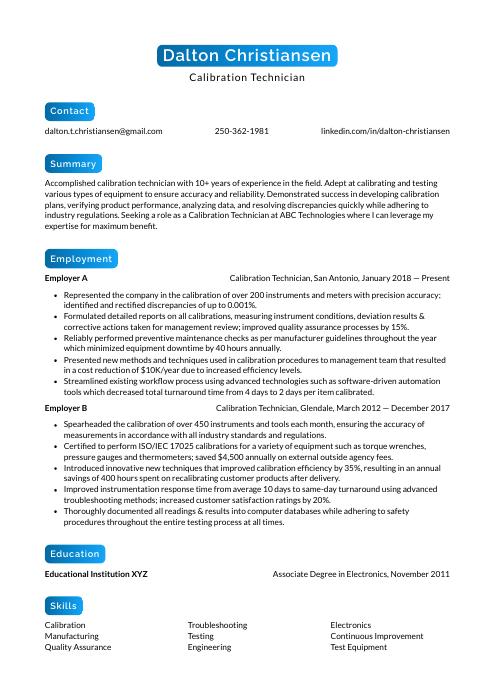 Kinkajou
Kinkajou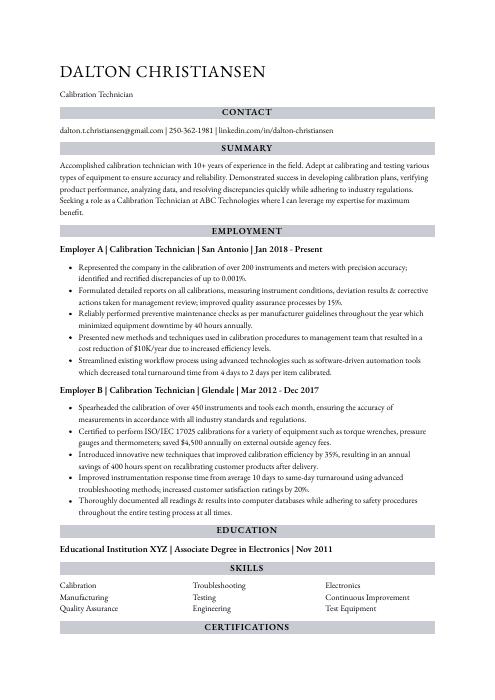 Numbat
Numbat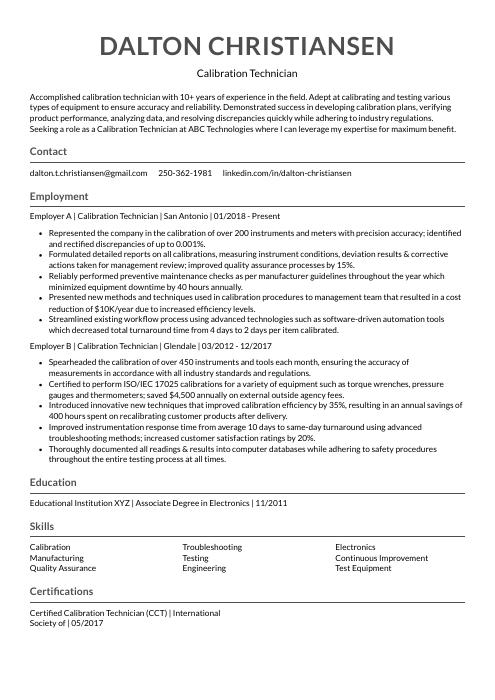 Indri
Indri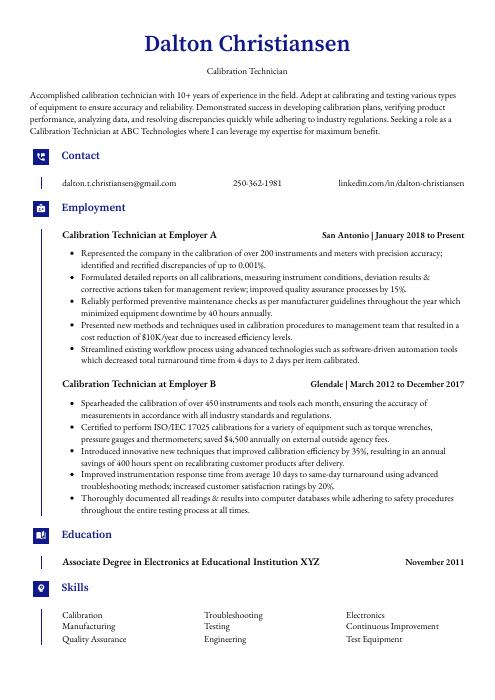 Gharial
Gharial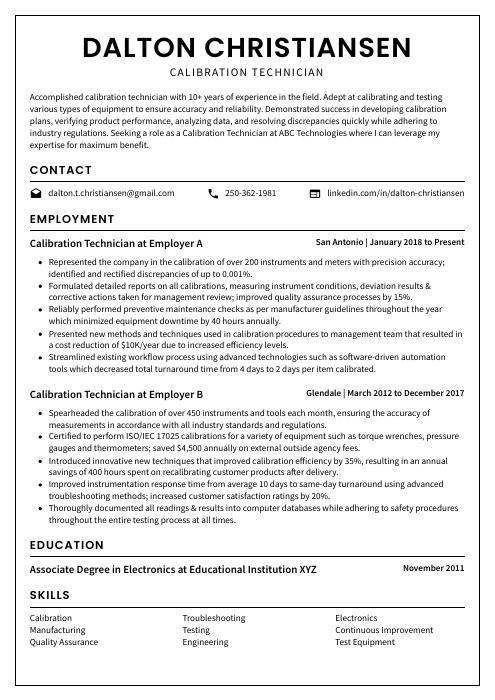 Cormorant
Cormorant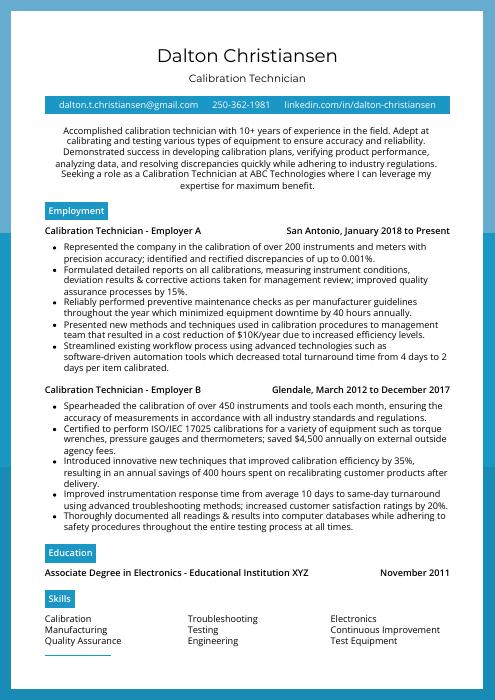 Rhea
Rhea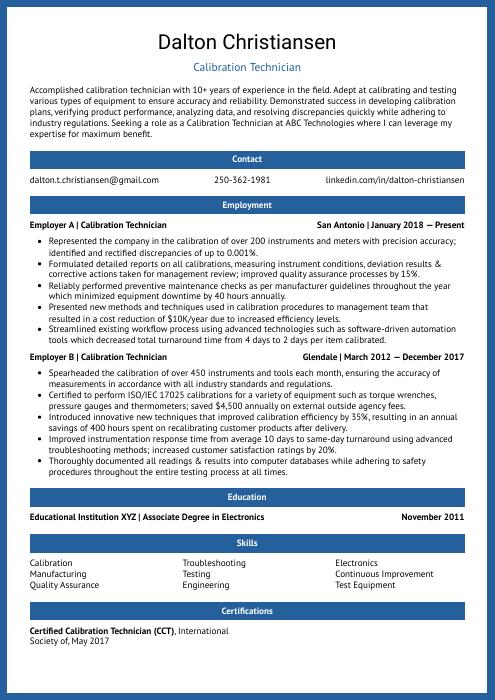 Ocelot
Ocelot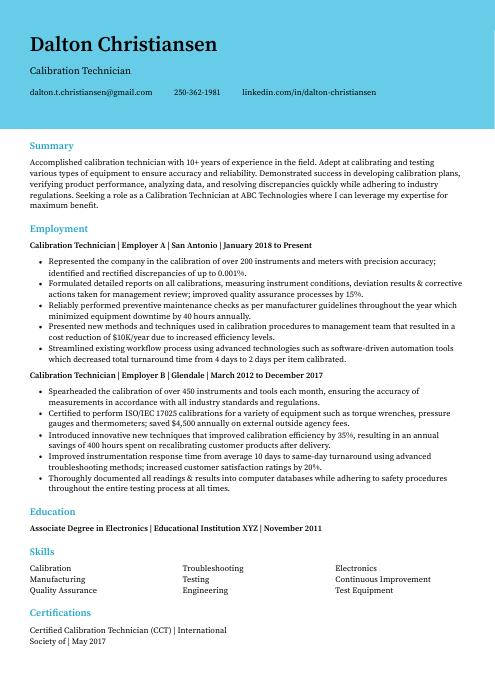 Dugong
Dugong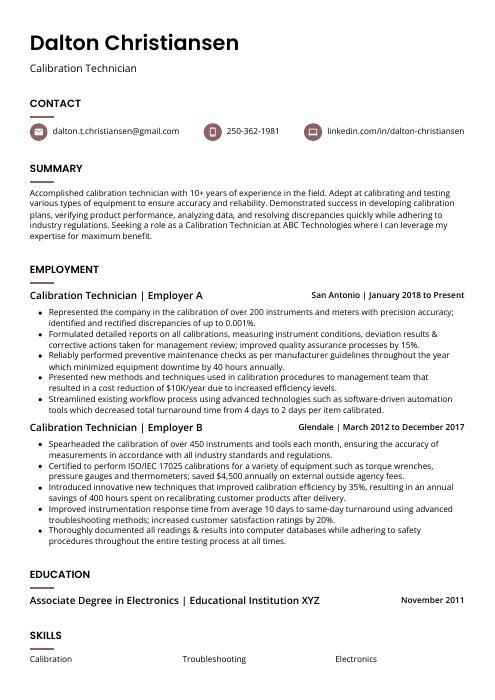 Fossa
Fossa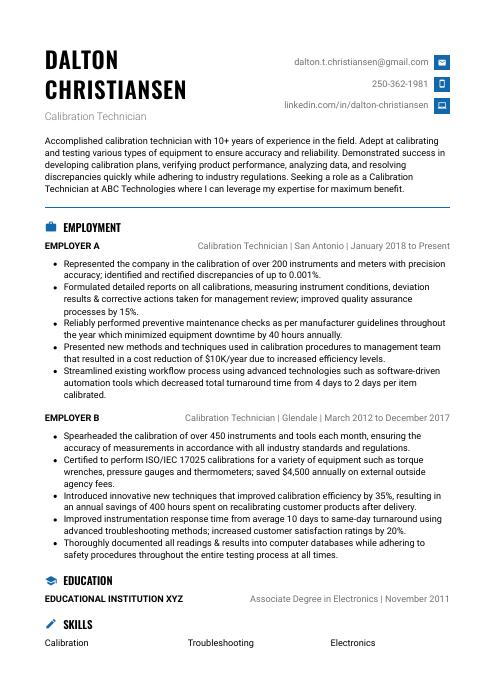 Echidna
Echidna Rezjumei
Rezjumei
